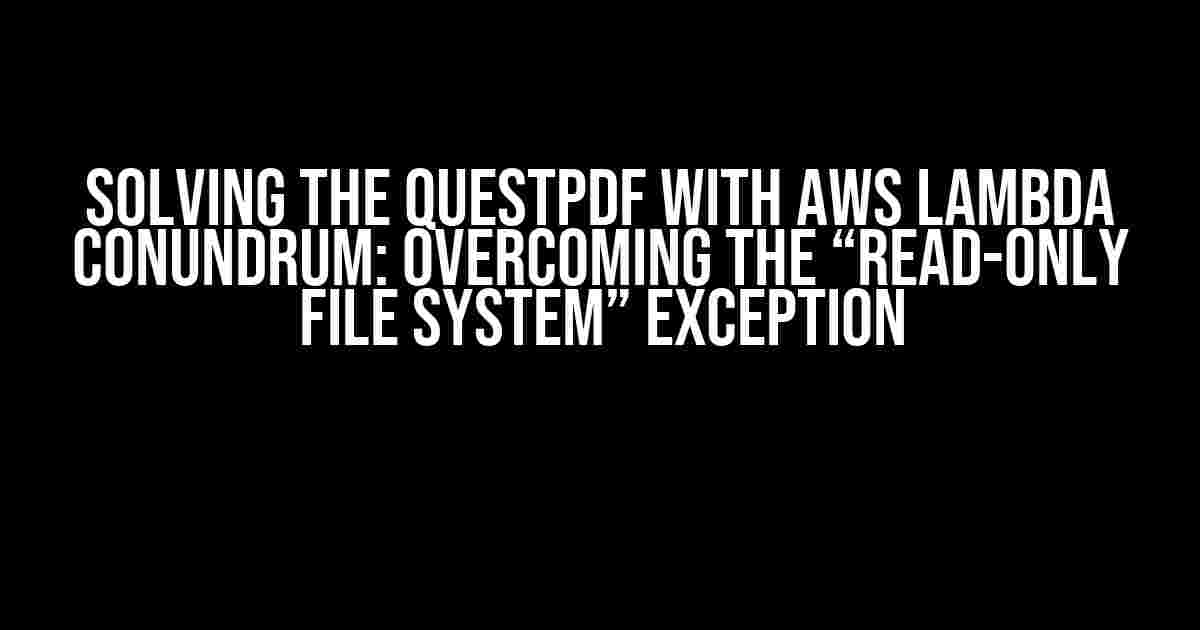Are you tired of encountering the frustrating “Read-only file system” exception when trying to generate PDFs using QuestPDF with AWS Lambda? You’re not alone! In this comprehensive guide, we’ll delve into the root cause of this issue and provide step-by-step instructions to help you overcome it.
Understanding the Problem
The “Read-only file system” exception typically occurs when QuestPDF attempts to write files to the Lambda function’s file system. This is because AWS Lambda has a read-only file system, and any attempts to write files will result in an exception.
System.IO.IOException: Read-only file system : '/var/task/gdal_wrap.so'In this specific case, the exception is triggered when QuestPDF tries to access the `gdal_wrap.so` file, which is a required dependency for certain QuestPDF functionality.
Why Does QuestPDF Need to Write Files?
QuestPDF relies on various dependencies, such as GDAL, to perform tasks like image processing and font embedding. These dependencies often require temporary files to be written to the file system during the PDF generation process.
Solution 1: Use an In-Memory File System
One approach to overcome the “Read-only file system” exception is to use an in-memory file system. This allows QuestPDF to write temporary files to memory instead of the file system.
- Create a new directory in your project for the in-memory file system:
mkdir -p /tmp/questpdf- In your AWS Lambda function, set the `TMPDIR` environment variable to point to the new directory:
export TMPDIR=/tmp/questpdfThis will instruct QuestPDF to use the in-memory file system for temporary files.
Configuring QuestPDF to Use the In-Memory File System
To configure QuestPDF to use the in-memory file system, add the following code to your Lambda function:
using QuestPDF.Config;
using QuestPDF.Fluent;
using QuestPDF.Infrastructure;
// Set the in-memory file system configuration
QuestPDF.Configure(config =>
{
config.FileSystem.RegisterFileSystem(
new InMemoryFileSystem(
new InMemoryFileSystemOptions
{
BaseDirectory = "/tmp/questpdf"
}
)
);
});Solution 2: Package Dependencies as Part of the Lambda Function
An alternative approach is to package the required dependencies, including the `gdal_wrap.so` file, as part of the Lambda function.
- Install the required dependencies using a package manager like pip:
pip install gdal- Copy the installed dependencies to a directory within your project:
mkdir -p dependencies
cp /usr/lib/libgdal.so.26 dependencies/
cp /usr/lib/libgdal.so dependencies/
cp /usr/lib/libgdalwrap.so dependencies/Note that the exact package names and versions may vary depending on your system and requirements.
Updating the Lambda Function to Use the Packaged Dependencies
In your AWS Lambda function, update the ` handler` method to include the packaged dependencies:
public async Task<string> Handler(ILambdaContext context)
{
// Set the LD_LIBRARY_PATH environment variable to point to the packaged dependencies
Environment.SetEnvironmentVariable("LD_LIBRARY_PATH", $"{Environment.CurrentDirectory}/dependencies");
// Generate the PDF using QuestPDF
var pdf = new PdfDocument();
// ...
return pdf.GeneratePdf();
}Additional Considerations
When using QuestPDF with AWS Lambda, it’s essential to keep the following points in mind:
- Dependency Management**: Ensure that all required dependencies are properly installed and packaged with the Lambda function.
- File System Limitations**: Be aware of the limitations of the AWS Lambda file system, and use in-memory file systems or package dependencies accordingly.
- Performance Optimization**: Optimize your PDF generation process to minimize the usage of temporary files and reduce the overall function execution time.
Conclusion
In this article, we’ve explored two solutions to overcome the “Read-only file system” exception when using QuestPDF with AWS Lambda. By implementing an in-memory file system or packaging dependencies as part of the Lambda function, you can successfully generate PDFs using QuestPDF in an AWS Lambda environment.
| Solution | Description |
|---|---|
| In-Memory File System | Use an in-memory file system to allow QuestPDF to write temporary files to memory instead of the file system. |
| Package Dependencies | Package the required dependencies, including the `gdal_wrap.so` file, as part of the Lambda function. |
By following these solutions and considering the additional considerations outlined in this article, you’ll be well on your way to generating PDFs using QuestPDF with AWS Lambda.
Frequently Asked Question
Get the answers to the most frequently asked questions about QuestPDF with AWS Lambda and overcome the “Read-only file system” exception.
What is the “Read-only file system” exception in QuestPDF with AWS Lambda?
The “Read-only file system” exception occurs when QuestPDF tries to write to the file system in an AWS Lambda function, which is read-only by default. This exception is triggered when QuestPDF attempts to load the GDAL library, which requires writing to the file system.
Why does QuestPDF require writing to the file system?
QuestPDF requires writing to the file system to load the GDAL library, which is a dependency for geospatial operations. The GDAL library needs to write temporary files to the file system during its initialization.
How can I resolve the “Read-only file system” exception in QuestPDF with AWS Lambda?
To resolve the exception, you need to add a license file to your AWS Lambda function. You can do this by creating a folder in your project directory, adding the license file to it, and then including that folder in your Lambda function deployment package.
What is the correct way to add a license file to my AWS Lambda function?
To add a license file, create a new folder in your project directory, name it ” QuestPDF_license”, and add the license file to it. Then, in your AWS Lambda function configuration, make sure to include the folder in the deployment package by adding it to the “Handler” section.
Will adding a license file affect the performance of my AWS Lambda function?
No, adding a license file will not significantly affect the performance of your AWS Lambda function. The license file is only required for QuestPDF to function correctly, and it does not impact the execution time or memory usage of your Lambda function.


